All reports
Filter
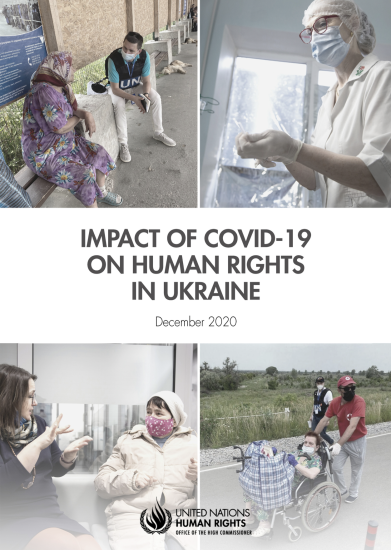 This thematic report by the Office of the United Nations High Commissioner for Human Rights (OHCHR) on the impact of COVID-19 on human rights in Ukraine covers the period from 20 February 2020, when a group of persons evacuated from Wuhan, China, was brought to Ukraine, to 6 December 2020. It is based on the work of the United Nations Human Rights Monitoring Mission in Ukraine (HRMMU).
This thematic report by the Office of the United Nations High Commissioner for Human Rights (OHCHR) on the impact of COVID-19 on human rights in Ukraine covers the period from 20 February 2020, when a group of persons evacuated from Wuhan, China, was brought to Ukraine, to 6 December 2020. It is based on the work of the United Nations Human Rights Monitoring Mission in Ukraine (HRMMU).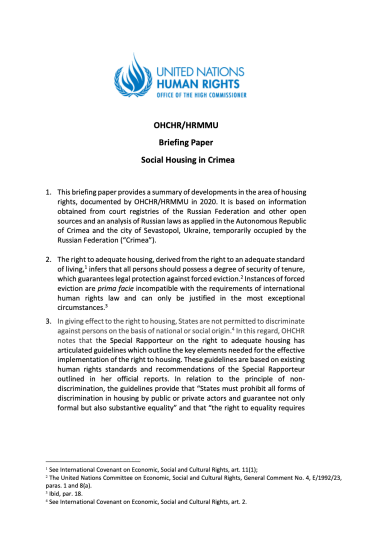 This briefing paper provides a summary of developments in the area of housing rights, documented by OHCHR/HRMMU in 2020. It is based on information obtained from court registries of the Russian Federation and other open sources and an analysis of Russian laws as applied in the Autonomous Republic of Crimea and the city of Sevastopol, Ukraine, temporarily occupied by the Russian Federation (“Crimea”).
This briefing paper provides a summary of developments in the area of housing rights, documented by OHCHR/HRMMU in 2020. It is based on information obtained from court registries of the Russian Federation and other open sources and an analysis of Russian laws as applied in the Autonomous Republic of Crimea and the city of Sevastopol, Ukraine, temporarily occupied by the Russian Federation (“Crimea”).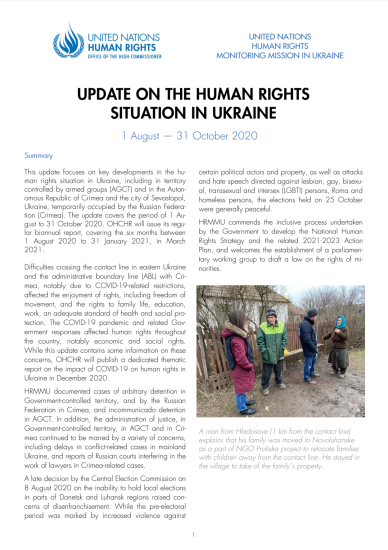 This update focuses on key developments in the human rights situation in Ukraine, including in territory controlled by armed groups (AGCT) and in the Autonomous Republic of Crimea and the city of Sevastopol, Ukraine, temporarily occupied by the Russian Federation (Crimea). The update covers the period of 1 August to 31 October 2020. OHCHR will issue its regular biannual report, covering the six months between 1 August 2020 to 31 January 2021, in March 2021.
This update focuses on key developments in the human rights situation in Ukraine, including in territory controlled by armed groups (AGCT) and in the Autonomous Republic of Crimea and the city of Sevastopol, Ukraine, temporarily occupied by the Russian Federation (Crimea). The update covers the period of 1 August to 31 October 2020. OHCHR will issue its regular biannual report, covering the six months between 1 August 2020 to 31 January 2021, in March 2021.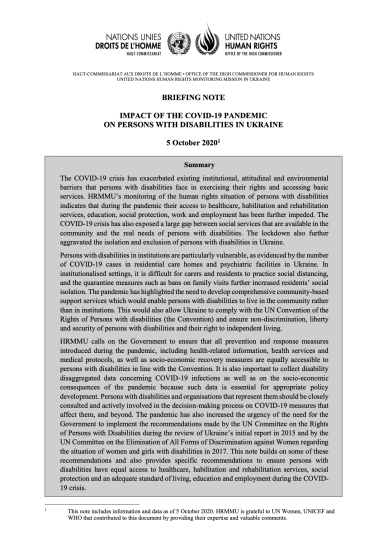 The COVID-19 crisis has exacerbated existing institutional, attitudinal and environmental barriers that persons with disabilities face in exercising their rights and accessing basic services. HRMMU’s monitoring of the human rights situation of persons with disabilities indicates that during the pandemic their access to healthcare, habilitation and rehabilitation services, education, social protection, work and employment has been further impeded. The COVID-19 crisis has also exposed a large gap between social services that are available in the community and the real needs of persons with disabilities. The lockdown also further aggravated the isolation and exclusion of persons with disabilities in Ukraine.
The COVID-19 crisis has exacerbated existing institutional, attitudinal and environmental barriers that persons with disabilities face in exercising their rights and accessing basic services. HRMMU’s monitoring of the human rights situation of persons with disabilities indicates that during the pandemic their access to healthcare, habilitation and rehabilitation services, education, social protection, work and employment has been further impeded. The COVID-19 crisis has also exposed a large gap between social services that are available in the community and the real needs of persons with disabilities. The lockdown also further aggravated the isolation and exclusion of persons with disabilities in Ukraine.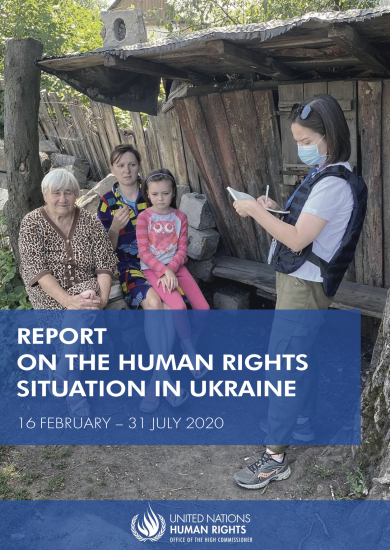 This thirtieth report by the Office of the United Nations High Commissioner for Human Rights (OHCHR) on the human rights situation in Ukraine covers the period from 16 February to 31 July 2020. It is based on the work of the United Nations Human Rights Monitoring Mission in Ukraine (HRMMU).
This thirtieth report by the Office of the United Nations High Commissioner for Human Rights (OHCHR) on the human rights situation in Ukraine covers the period from 16 February to 31 July 2020. It is based on the work of the United Nations Human Rights Monitoring Mission in Ukraine (HRMMU).
